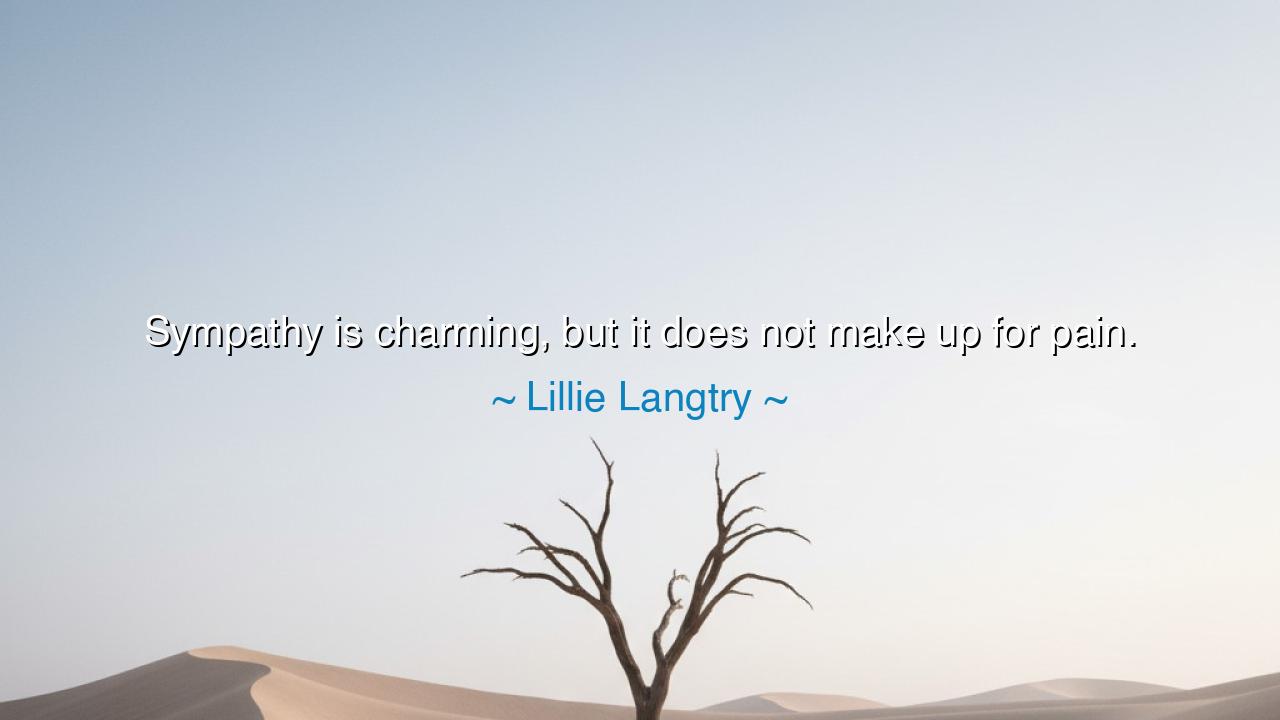
Sympathy is charming, but it does not make up for pain.






Hear the words of Lillie Langtry, the famed “Jersey Lily,” whose beauty once captured kings and whose wit cut through illusions: “Sympathy is charming, but it does not make up for pain.” In this sharp utterance lies the truth of lived experience, for she knew well both the glitter of admiration and the shadow of private suffering. Her words remind us that the balm of kind sentiment, though sweet upon the ear, can never erase the fire of real anguish burning within the heart.
Sympathy is indeed a noble gift, a gesture of recognition that one’s suffering has been seen and acknowledged. It is charming because it soothes loneliness; it tells the wounded soul, “you are not forgotten.” And yet, as Langtry declares, it cannot replace the hard fact of pain. A mourner who receives condolences still must walk through grief. A patient in illness, though surrounded by compassion, still endures the sharp edge of suffering. Thus sympathy is like a flower placed upon a grave—lovely, fragrant, but unable to raise the dead.
The ancients themselves understood this. When Priam knelt before Achilles to beg for the body of Hector, Achilles was moved to sympathy, and wept with him. Yet the father’s pain was not erased, nor was the warrior’s rage undone. Their shared tears did not resurrect Hector, but they gave solace in the moment. Sympathy may soften the soul, but it cannot undo the reality of loss. In this distinction lies the wisdom of Langtry: to confuse sympathy with healing is folly, for one is gentle adornment, the other is laborious endurance.
Langtry’s own life illustrates her insight. Celebrated in the courts of Europe, beloved on the stage, she was surrounded by admirers. She received oceans of sympathy when betrayed, when slandered, when her fortunes waned. Yet no cascade of kind words could cancel the sting of scandal, nor the sorrow of her personal losses. She knew the gulf between charm and cure, between being pitied and being healed. Hence her words: a warning to all who imagine that compassion alone is remedy.
Yet let us not despise sympathy. Though it cannot abolish pain, it can steady the sufferer as they endure it. The soldier still bleeds, but his spirit may rise when he hears his comrades’ voices. The widow still weeps, but the hand upon her shoulder prevents her from collapsing entirely. Sympathy does not conquer pain, but it can help bear it. Its value lies not in substitution, but in accompaniment.
The lesson then, O listener, is twofold. First, when you offer sympathy, know its limit: do not believe that words alone can heal wounds. Instead, let your compassion be joined with action, with presence, with deeds that lighten the burden. Second, when you suffer, accept sympathy as comfort but do not mistake it for cure. Your journey through pain is your own, and only by walking it with courage and endurance will healing come.
Therefore, remember Langtry’s wisdom: sympathy is like the gentle light of the moon—charming, cooling, lovely to behold—but pain is the burning of the sun, and no moonlight can quench its fire. Let us offer sympathy generously, but let us also act to relieve suffering where we can, binding wounds, lifting burdens, and standing faithfully beside those who grieve.
So take this to heart: speak kindly, but also serve. Offer sympathy, but do not stop there. Strive to be the one whose hand brings comfort, whose presence eases the ache, whose deeds, however small, lessen the weight of another’s sorrow. For though sympathy cannot erase pain, it can remind the sufferer that they are not abandoned—and sometimes, that reminder itself is the first step toward healing.






AAdministratorAdministrator
Welcome, honored guests. Please leave a comment, we will respond soon